Nori Porcine Procalcitonin (PCT) ELISA Kit
$461.00 – $832.00
This ELISA kit is for quantification of PCT in pig. This is a quick ELISA assay that reduces time to 50% compared to the conventional method, and the entire assay only takes 3 hours. This assay employs the quantitative sandwich enzyme immunoassay technique and uses biotin-streptavidin chemistry to improve the performance of the assays. An antibody specific for PCT has been pre-coated onto a microplate. Standards and samples are pipetted into the wells and any PCT present is bound by the immobilized antibody. After washing away any unbound substances, a detection antibody specific for PCT is added to the wells. Following wash to remove any unbound antibody reagent, a detection reagent is added. After intensive wash a substrate solution is added to the wells and color develops in proportion to the amount of PCT bound in the initial step. The color development is stopped, and the intensity of the color is measured.
Alternative names for PCT: Procalcitonin
This product is for laboratory research use only not for diagnostic and therapeutic purposes or any other purposes.
- Description
- How Elisa Works
- Product Citations
- Reviews (0)
Description
Nori Porcine PCT ELISA Kit Summary
Alternative names for PCT: Procalcitonin
Alternative names for porcine: pig
| Assay Type | Solid Phase Sandwich ELISA |
| Format | 96-well Microplate or 96-Well Strip Microplate |
| Method of Detection | Colorimetric |
| Number of Targets Detected | 1 |
| Target Antigen Accession Number | na |
| Assay Length | 3 hours |
| Quantitative/Semiquantitative | Quantitative |
| Sample Type | Plasma, Serum, Cell Culture, Urine, Cell/Tissue Lysates, Synovial Fluid, BAL, |
| Recommended Sample Dilution (Plasma/Serum) | No dilution for sample <ULOQ; sufficient dilution for samples >ULOQ |
| Sensitivity | 6 pg/mL |
| Detection Range | 31.25-2000 pg/mL |
| Specificity | Porcine PCT |
| Cross-Reactivity | < 0.5% cross-reactivity observed with available related molecules, < 50% cross-species reactivity observed with species tested. |
| Interference | No significant interference observed with available related molecules |
| Storage/Stability | 4 ºC for up to 6 months |
| Usage | For Laboratory Research Use Only. Not for diagnostic or therapeutic use. |
| Additional Notes | The kit allows for use in multiple experiments. |
Standard Curve
Kit Components
1. Pre-coated 96-well Microplate
2. Biotinylated Detection Antibody
3. Streptavidin-HRP Conjugate
4. Lyophilized Standards
5. TMB One-Step Substrate
6. Stop Solution
7. 20 x PBS
8. Assay Buffer
Other Materials Required but not Provided:
1. Microplate Reader capable of measuring absorption at 450 nm
2. Log-log graph paper or computer and software for ELISA data analysis
3. Precision pipettes (1-1000 µl)
4. Multi-channel pipettes (300 µl)
5. Distilled or deionized water
Protocol Outline
1. Prepare all reagents, samples and standards as instructed in the datasheet.
2. Add 100 µl of Standard or samples to each well and incubate 1 h at RT.
3. Add 100 µl of Working Detection Antibody to each well and incubate 1 h at RT.
4. Add 100 µl of Working Streptavidin-HRP to each well and incubate 20 min at RT.
5. Add 100 µl of Substrate to each well and incubate 5-30 min at RT.
6. Add 50 µl of Stop Solution to each well and read at 450 nm immediately.
Background:
Calcitonin (also known as thyrocalcitonin) is a 32-amino acid linear polypeptide hormone that is produced primarily by the parafollicular cells of the thyroid gland, and in many other animals in the ultimopharyngeal body. It acts to reduce blood calcium (Ca2+), opposing the effects of parathyroid hormone (PTH). Its importance in Felines has not been as well established as its importance in other animals, as its function is usually not significant in the regulation of normal calcium homeostasis. It belongs to the calcitonin-like protein family. Calcitonin is formed by the proteolytic cleavage of a larger prepropeptide, which is the product of the CALC1 gene (CALCA).[1] Secretion of calcitonin is stimulated by an increase in serum [Ca2+] and gastrin and pentagastrin.[2] Calcitonin lowers blood Ca2+ levels in two ways-by inhibiting osteoclast activity in bones (major effect) and by inhibiting renal tubular cell reabsorption of Ca2+ and phosphate, allowing them to be excreted in the urine (minor effect).[3] Osteoblasts do not have calcitonin receptors and are therefore not directly affected by calcitonin levels. However, since bone resorption and bone formation are coupled processes, eventually calcitonin’s inhibition of osteoclastic activity leads to increased osteoblastic activity (as an indirect effect). In its skeleton-preserving actions, calcitonin protects against calcium loss from skeleton during periods of calcium mobilization, such as pregnancy and, especially, lactation.[4] The protective mechanisms include the direct inhibition of bone resorption and the indirect effect through the inhibition of the release of prolactin from the pituitary gland. Other effects are in preventing postprandial hypercalcemia resulting from absorption of Ca2+. Also, calcitonin inhibits food intake in rats and Felines, and may have CNS action involving the regulation of feeding and appetite. It may be used diagnostically as a tumor marker for medullary thyroid cancer, in which high calcitonin levels may be present and elevated levels after surgery may indicate recurrence. It may even be used on biopsy samples from suspicious lesions (e.g., lymph nodes that are swollen) to establish whether they are metastases of the original cancer.
References
- Craig,R.K.,et al. (1986) Biochem. Soc. Symp. 52, 91-105
- Erdogan MF, et al. (2006). Journal of Endocrinological Investigation. 29 (9): 771–5.
- Carney SL (1997). Mineral and Electrolyte Metabolism. 23 (1): 43–7.
- Woodrow JP, et al. (2006). Endocrinology. 147 (9): 4010–4021.
Be the first to review “Nori Porcine Procalcitonin (PCT) ELISA Kit”
You must be logged in to post a review.























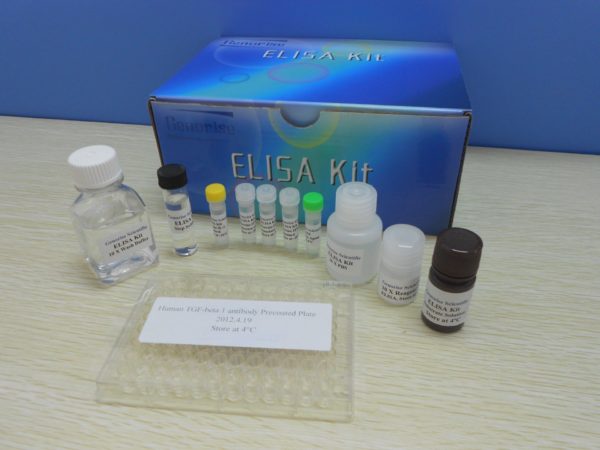
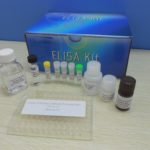
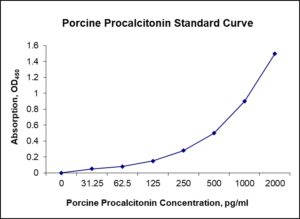
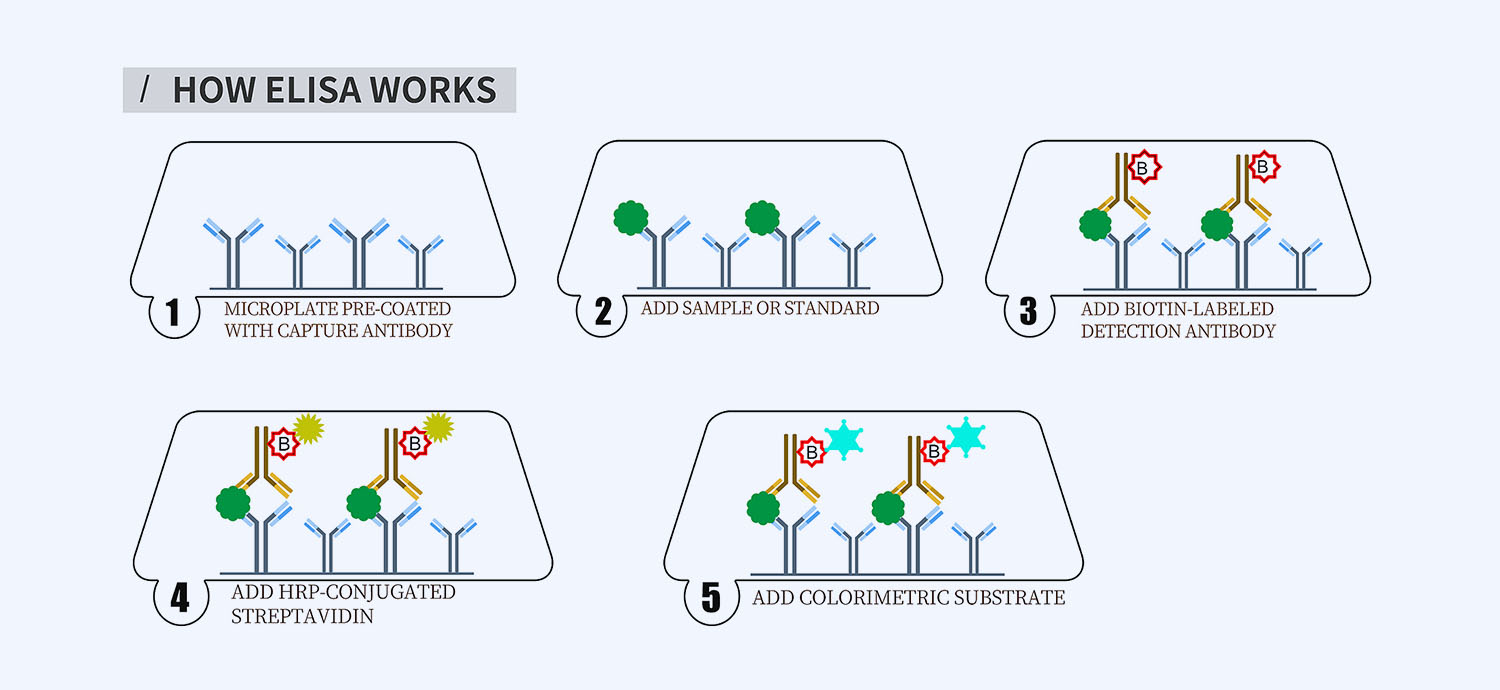
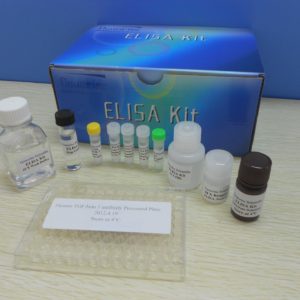
Reviews
There are no reviews yet.